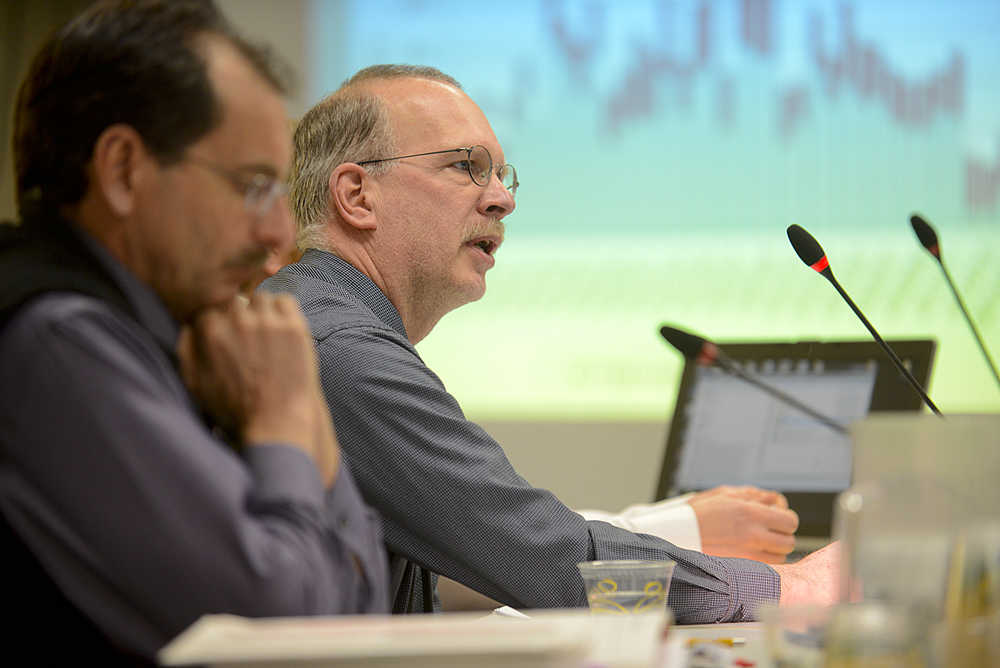ANCHORAGE — After three days of reports, public testimony and proposals on game issues stretching from Cordova to Glennallen and Kodiak to Anchorage, Alaska’s Board of Game is set to discuss a host of proposals on Kenai Peninsula game.
Regulatory changes to moose hunting seasons, areas, and methods, caps on brown bear harvest, ptarmigan bag limit reductions and proposals to restrict trapping in certain areas are all on the table in what Board Chairman Ted Spraker said would likely be a long day of some contentious discussion on game issues that have been building in recent years.
“We’re not going to finish,” he said Monday after the board adjourned later in the evening than normal.
When it comes to game, moose and bear have dominated the discussion in the game management unit 15, which covers most of the western Kenai Peninsula. Between it and unit 7, which encompasses the eastern end of the peninsula, the state and federal government manage about 8,400 square miles of area. Just over 70 percent of that area is owned and managed by the federal government, including the Kenai National Wildlife Refuge, Chugach National Forest and the Kenai Fjords National Park, which leaves about 30 percent in state and private hands.
State managers and refuge managers have clashed in recent years over the state’s management of brown bear hunting.
The U.S. Fish and Wildlife Service did an intensive study on the Kenai Peninsula brown bear population and estimated more than 600 bears in the area. After a 2013 board meeting in Kenai, during which public testimony was overwhelmingly in favor of reducing the brown bear population, the board dramatically liberalized the hunt and nearly 70 bears were killed either by hunting or through other human interactions.
In response to the jump in bear deaths, Kenai National Wildlife Refuge manager Andy Loranger closed sport hunting for 30 days on the refuge in late October of 2013, effectively closing down the season. Refuge managers closed it again in September of 2014, citing the high number of human-caused brown bear deaths.
Both times, residents and some state biologists called it a matter of federal overreach that needed to be addressed. Those issues will come to a head on Tuesday with a set of proposals to adjust the caps on the number of bears that can be taken each season.
Refuge managers suggested a cap of 40 total bears, with 8 adult females to keep the population steady, or 30 total bears with a cap of 5 adult females to allow the population to grown.
“The service believes that a cautious approach to Kenai brown bears is scientifically warranted,” Loranger said during his presentation to the board.
Alaska Department of Fish and Game management biologist Jeff Selinger said Fish and Game would likely recommend lower harvest caps than it has had in the past few years, but it wasn’t yet clear what those numbers would be. Spraker said board members would likely remember the testimony from Kenai Peninsula residents in 2013 when deliberating over the brown bear harvest caps.
“The Kenai public does not want to grow the population, they want to reduce the population,” Spraker said. “So I think what’s going to happen is we’ll have some pretty lively discussions.”
Another batch of proposals target the moose population which has done well in some southern portions of the peninsula and declined in others.
Several proposals deal with shortening the moose season unit-wide or adjusting the season to open later in the year. One would redefine what constitutes a legal bull moose and others deal with opening non-resident moose seasons.
The board will also take up proposals that would curtail trapping in Cooper Landing, Seward and Moose Pass — an area where dog walkers and trappers have sparred over usage of trails in recent years. The proposals would eliminate trapping entirely in several areas and force trappers to move at least 250 feet back from several trails in the area.
The board will also consider proposals to shorten the season reduce the bag limit for ptarmigan on the southern peninsula, allow an earlier opening date for beaver trapping, require trapping tags peninsula-wide and creating a new management area for Kachemak Bay.
Reach Rashah McChesney at rashah.mcchesney@peninsulaclarion.com or follow her on Twitter @litmuslens

